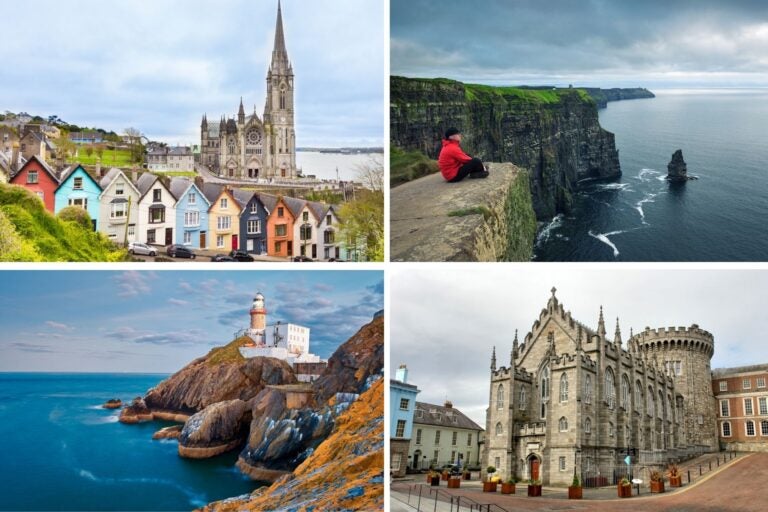Live in Ireland: Advantages and disadvantages
When deciding to live in Ireland, make sure you are aware of all the main aspects: education, health, economy and safety.
Often called the Emerald Isle for its stunning green landscapes, Ireland attracts people from all over the world. Whether you’re here to study, start a new job, work remotely, or just take time to travel, many choose to live in Ireland for a while and soak up everything it has to offer. Curious about what life here is really like? This article will help answer all your questions.
Ireland offers a unique mix of high living standards and beautiful natural surroundings, from green valleys and cliffs to peaceful nature reserves. But it’s important to understand things like how safe it is, what kind of healthcare and education systems it has, how strong the economy is, and whether the technology and infrastructure meet your needs. So, is living in Ireland the right choice for your next move? Let’s take a closer look.
What is the quality of life like in Ireland?
Living in Ireland means enjoying a high overall quality of life, thanks to a combination of factors that we’ll break down for you. These advantages make everyday life here easier, secure, and stable. Whether you’re planning to work remotely with Ireland’s digital nomad visa, study, or spend an extended time exploring, this is a country that’s full of pleasant surprises.
Find out what the Irish education system is like
Ireland has one of the most respected education systems in Europe, known for its high teaching standards, experienced faculty, and strong support for international students. Thousands of students come to study here through Irish government scholarships and private programs like Erasmus+ or funding from institutions such as Trinity College Dublin. And if you’re not an EU citizen, the government makes it easier to access education through a student visa.
Being a student in Ireland means having the peace of mind that comes with studying in a country that prioritizes education. According to OECD data from 2024, Ireland invests over 4% of its GDP in the sector. That commitment is clear in its modern campuses, top-ranking universities, and a wide range of academic programs designed to meet the needs of today’s global job market.
Some of the world’s top universities, according to the 2024 QS World University Rankings, include Trinity College Dublin, University College Dublin, University College Cork, and the National University of Ireland Galway. These institutions provide opportunities for internships with major companies, often leading to permanent job offers. Which one will you choose?

The security you need to live in another country
Thinking about moving abroad often comes with worries about safety, but Ireland is one of the safest places you can choose. In fact, the 2024 Global Peace Index ranks it as the third most peaceful country worldwide. Minor crimes like pickpocketing mostly occur in larger cities such as Dublin and busy tourist spots, but overall, you can feel secure living here.

A public and private healthcare system
Ireland’s healthcare system combines public and private services, all overseen by the Health Service Executive (HSE). So, what does this mixed system mean in practice? Residents contribute through taxes that help fund medical care, but some things, like medications, require copays. To fill the gaps, many people choose to take out private health insurance, which also helps them avoid long waiting times at private hospitals.
Wondering how healthcare works for foreigners in Ireland? If you’re from an EU country, you can apply for the European Health Insurance Card (EHIC) back home, which gives you access to free medical care at hospitals like St. James’s in Dublin or Cork University Hospital. If you’re not from the EU, you’ll need to have private health insurance and can receive treatment at private clinics such as Blackrock Clinic in Dublin or through the Bon Secours Health System.
Official data: The annual Euro Health Consumer Index 2023 report ranked Ireland in the top 15 in Europe for the quality of its hospital care.
Ireland’s high cost of living and salaries
The cost to live in Ireland is among the highest in Europe, ranking third overall. Dublin stands out as the most expensive city on the island, especially when it comes to housing, groceries, transport, and leisure. At the same time, Ireland is home to global tech giants like Google, Facebook, and Apple, which has helped grow the tech industry and attract digital nomads worldwide.
Salaries in Ireland tend to be quite competitive, according to a 2024 OECD report, the average annual income is about $52,000. So if you’re moving here to work for a local company, that kind of pay can help cover the higher cost of living. Research from IDA Ireland and the Central Statistics Office also shows which jobs are most commonly held by foreigners in the country:
- Information and communication technologies (ICT)
- Financial services and accounting
- Pharmaceutical and biotechnology
- Education and language training
- Hospitality and tourism
- Healthcare
What’s the internet connection like in Ireland?
As mentioned earlier, Ireland is home to some of the world’s leading tech companies, which has helped the country build one of the best telecom infrastructures in Europe. You can expect average internet speeds of around 121 Mbps, according to the 2024 Speedtest Global Index, with providers like Eir, Vodafone, and Three Ireland delivering reliable service.
You’ll find reliable 4G and 5G coverage across the whole country, and online shopping is easy with quick delivery and affordable shipping. But if you need a stronger, more consistent internet connection—especially for remote work, video calls, or downloading apps—Holafly’s monthly plans are worth considering. Their unlimited plan lets you connect two devices at once and costs $67.90 a month.
Important: If you are a frequent traveler and want to stay connected without worrying about expensive roaming or looking for a new SIM at every destination, Holafly’s subscription plans are for you. With a single eSIM, enjoy internet in more than 170 countries for a fixed price and no surprises on your bill. Travel without limits and connect easily and securely! 🚀🌍

Advantages of living in Ireland
Want to discover all the perks of living in Ireland? Fair warning: once you learn about them, you’ll be eager to start your adventure on the Emerald Isle. So far, we’ve covered the essentials of daily life here, but we haven’t yet shared some of the truly special places you can explore. Keep reading as we walk you through everything that makes living here so special.
- Breathtaking nature: If you drive around Ireland, you’ll find yourself surrounded by nature in just a few minutes, with easy access to spots like the Cliffs of Moher, Killarney National Park, and the Wicklow Mountains.
- Excellent air quality: Air pollution levels in Ireland are very low, making its air quality some of the best in Europe, according to the European Environment Agency’s Air Quality Index. This is largely thanks to the country’s low population density and strong environmental policies.
- Outdoor activities: Ireland offers endless opportunities to connect with nature every day. If you enjoy hiking, cycling, climbing, or surfing, you’ll find the perfect conditions to support both your physical and mental well-being.
- Availability of coliving and coworking spaces: If you’re a digital nomad, you’ll find plenty of great places to live and work remotely. In Dublin, for example, some of the best coliving spaces offer more affordable rates than traditional rentals, starting at around $1,358 per month.
- Friendly society: The Irish are known for their warm hospitality, so you’ll quickly meet new people and build friendships that make settling into a new country much easier.

Disadvantages of living in Ireland
If you’re feeling a bit confused or unsure right now, that’s completely normal. We’ve covered many of the great things about life there, but it’s also important to be aware of some challenges you might encounter. Here’s a closer look at those aspects:
- High cost of housing: Furnished apartments in Ireland can be pricey, especially in Dublin, where rents start around $2,080 a month. It’s a bit more affordable outside the city.
- Rainy climate: Ireland’s weather can be pretty unpredictable, with lots of rain and cloudy days. If you’re coming from a sunnier country, the lack of sunshine could affect your mood.
- High cost of living: In addition to housing, you’ll need to cover the cost of transport, food, and entertainment, which are generally higher than in many other European countries.
- Saturation of health services: While healthcare in Ireland is generally high quality, wait times for specialist appointments or procedures can be quite long. That’s why having private health insurance is a smart idea.
- Bureaucratic procedures: In Ireland, even something as basic as getting your PPS Number (social security number) can be a slow process and often requires quite a bit of paperwork.
Frequently asked questions about living in Ireland
It’s not necessary, as English is the main language used in daily life, as well as in work and education.
If you speak English fluently, you’ll find plenty of opportunities in industries like tech, finance, education, and healthcare. Even if you’re just starting out or switching careers, there are entry-level roles that can help you gain experience in Ireland.
Yes, thanks to the connections with Dublin, Cork and Shannon airports, it’s affordable to travel to other European countries with Ryanair and Aer Lingus airlines.
Yes, Ireland is one of the safest countries in Europe, with very low crime rates. Some of the safest cities include Galway, Cork, Kilkenny, Waterford, Sligo, and certain neighborhoods in Dublin.
Of course, you can bring your furry friend along on your adventure, but it’s important to know the entry requirements: microchip, passport, and vaccinations. Plus, Ireland is very pet-friendly, so you’ll find you can take your pets just about anywhere.





 Language
Language 


















 No results found
No results found


